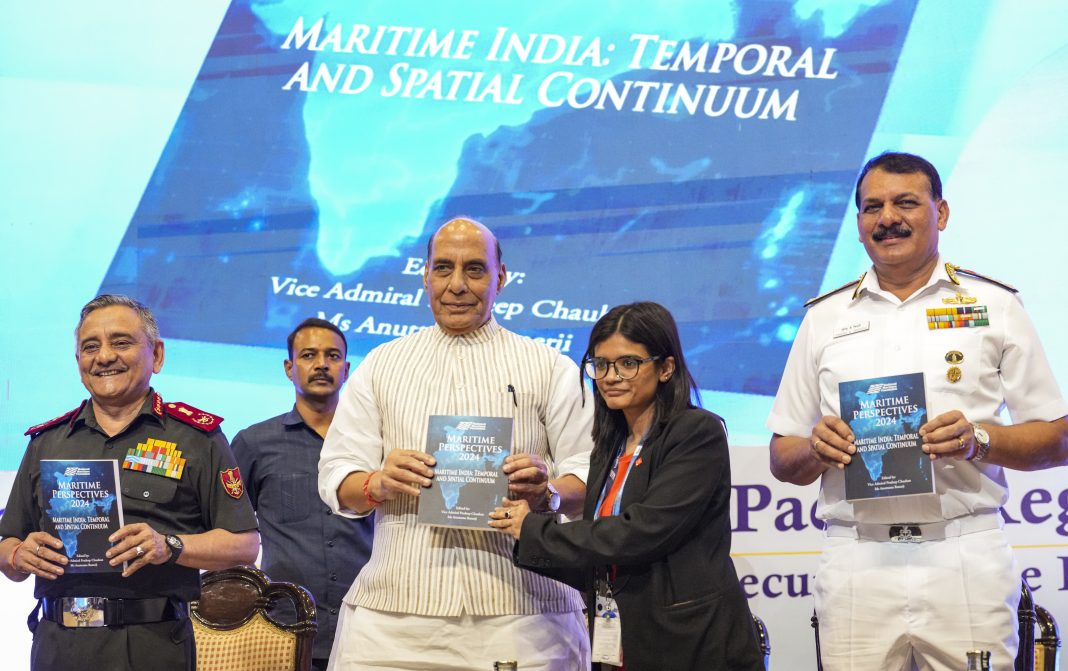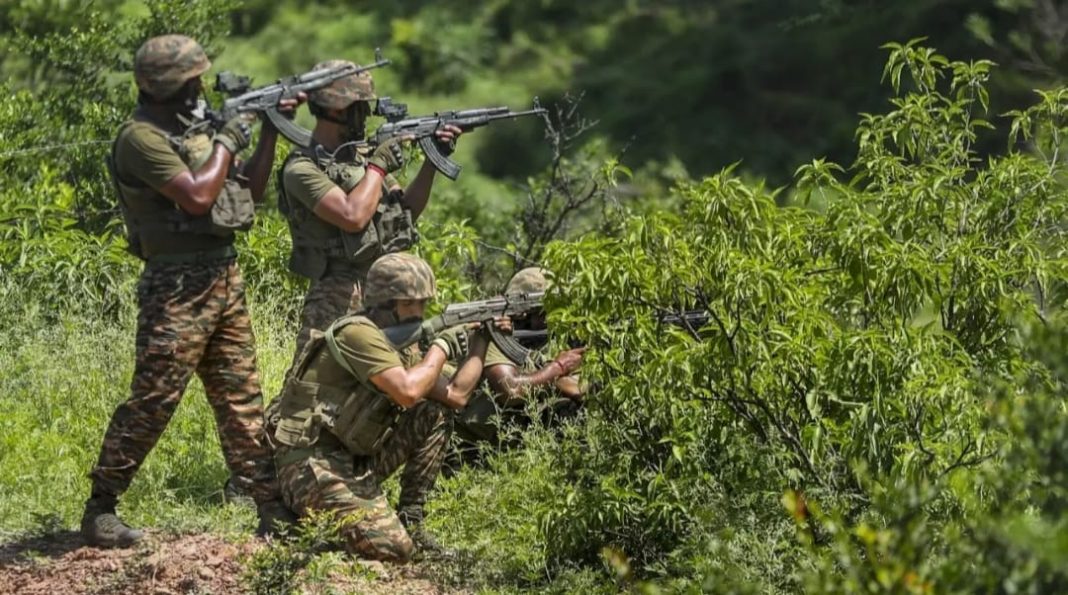New Delhi, Oct 4: India has consistently advocated for a peaceful resolution to disputes and has sought to promote cooperation among nations in the Indo-Pacific, with a strong emphasis on the centrality of ASEAN, Defence Minister Rajnath Singh said on Friday.
His remarks come amid China’s increasing military muscle-flexing in the region.
In his address at the Indo-Pacific Regional Dialogue (IPRD) 2024 here, he also expressed concern over “certain attempts to monopolise and weaponise critical resources for strategic reasons”, terming these tendencies as not conducive for the global good.
Singh emphasised that India’s engagement with its partners is guided by the understanding that true progress can only be achieved through collective action and synergy, and due to these efforts, it is now considered as a “credible and preferred security partner and first responder” in the region.
“India’s vision for the Indo-Pacific is based on Prime Minister Narendra Modi’s idea of SAGAR (Security and Growth for All in the Region) as we believe in fostering partnerships that prioritise sustainable development, economic growth and mutual security,” he was quoted as saying in a statement issued by the Defence Ministry.
He underscored peaceful coexistence and comity among nations, and drew upon the ancient Indian philosophy of humankind’s symbiotic existence in harmony with nature as a way ahead in the exploration and management of marine resources.
Singh reiterated India’s unwavering resolve to a rule-based international order, respect for international law and adherence to the principles enshrined in the UN Convention on the Law of the Sea, describing them as the “cornerstones of foreign policy”.
“India has consistently advocated for a peaceful resolution to disputes and has sought to promote cooperation among nations in the Indo-Pacific, with a strong emphasis on the centrality of ASEAN in fostering regional dialogue, stability and collective growth,” he said.
The minister also underscored India’s commitment to ensuring the safety and security of the vital international maritime routes.
The engagement with regional partners, including joint exercises and information-sharing initiatives, is aimed at strengthening the collective maritime security framework, he added.
Singh underlined that the Indian armed forces, especially the Navy, has been at the forefront of cooperative endeavours with countries of the region, and are continuously working towards building their capacity and capabilities.
“While India’s endeavour for maritime cooperation continues, its interests are not in conflict with any other country. At the same time, interests of any other nation should not come in conflict with other nations. This is the spirit in which we must work together,” he added.
The defence minister pointed out that the rapidly evolving global maritime landscape is shaped by shifting power dynamics, resource competition and emerging security threats.
He added the emergence of the Indo-Pacific theatre reflects a visible balancing of global power.
“The Indo-Pacific region has emerged as the world’s most dynamic geopolitical zone and is the centre of gravity of the economic and strategic interests. It also carries a degree of pre-existing international tension, rivalry and conflict,” the minister said.
While some challenges are of local nature, many challenges have global ramifications, he underlined.
“With respect to marine resources, we are witnessing a significant increase in geopolitical competition. As populations continue to grow, the demand for marine resources has surged, leading to heightened tensions and competition among nations,” he added.
Sharing insights on the subject of ‘global commons’, the natural resources such as the ocean, outer space, climate, clean air, etc., which is shared by all of humanity, Singh said these are essential to maintain a sustainable planet.
He stressed on the need to create a balance of competing interests, which can offer numerous ecological, economic and social benefits transcending national boundaries.
Singh also touched on the concept of ‘tragedy of the commons’, a scenario where individuals, acting in their own self-interest, deplete shared resources, leading to collective ruin.
He termed it as a “looming threat”, which can only be dealt with if the international community comes together and acts swiftly for sustainable management of shared global commons.
“Evidence of this tragedy, including environmental degradation, over-extraction of certain resources, and increasing geopolitical tensions is already visible. We are witnessing localised incidents of conflict and a wider undercurrent of international tension in recent years,” said Singh.
“As the world transforms from an industrial world to a technological world, from a fossil fuel-based economy to renewables, this threat is only going to increase, unless we take pre-emptive steps to control possible damage,” he added.
In his address, Navy Chief Admiral Dinesh K. Tripathi emphasised the relevance of the oceanic spaces, specifically the Indo-Pacific, for India’s economic growth and security.
Stressing that India’s maritime policy of SAGAR envisioned collective prosperity and security for all in the region, he advocated collaboration and cooperation as the principal means to achieve this end-state.
Singh also released a book titled ‘Maritime India: Temporal and Spatial Continuum’, published by the National Maritime Foundation (NMF).
Chief of Defence Staff General Anil Chauhan; Army Chief General Upendra Dwivedi; IAF Chief Air Chief Marshal AP Singh; Chairman, NMF Admiral Karambir Singh (retd); DG, NMF Vice Admiral Pradeep Chauhan (retd); senior officials of the ministry, foreign delegates and representatives of think-tanks of India and abroad attended the event.
The IPRD is an annual apex-level regional strategic dialogue of the Indian Navy which aims to sequentially flesh out the seven spokes of the Indo-Pacific Oceans Initiative (IPOI).
This year, the three-day conference opened on a vibrant and intellectually stimulating note on October 3. Through its central theme of ‘Resource-Geopolitics and Security in the Indo-Pacific’, this year’s conference focuses on ‘Marine Resources’ and ‘Maritime Security’ pillars of IPOI.
The IPRD-2024 is being organised by the Indian Navy in association with NMF as its knowledge partner. (PTI)




